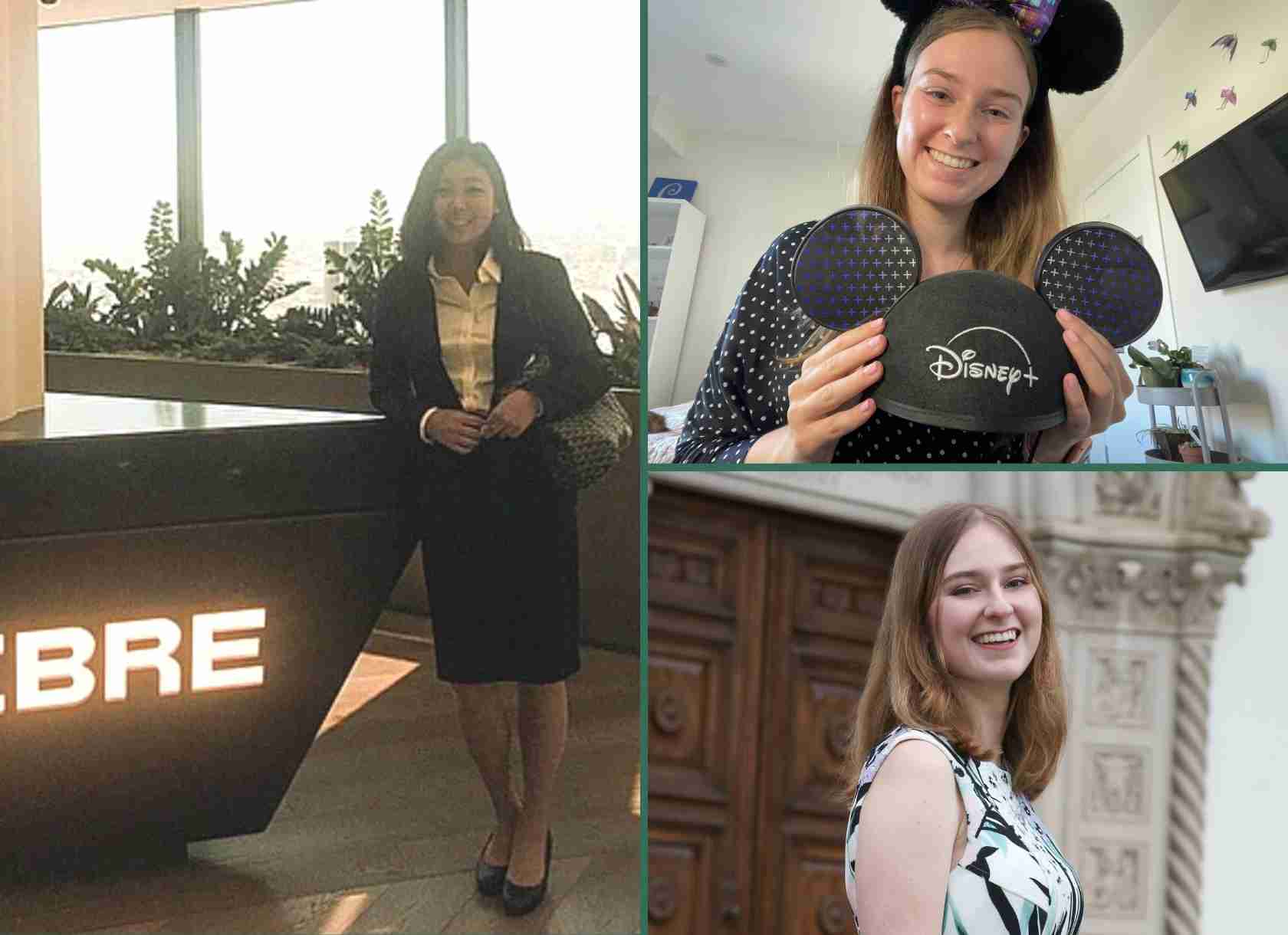By Emily Glory Peters

Unpaid internships: a mixed blessing of work experience without compensation that continues to plague the early career landscape for college students. Still, their prevalence hasn’t stopped Scripps students, 80 percent of whom complete at least one internship before graduating.
It’s a striking statistic for a liberal arts women’s college which, while known for graduating spectacular critical thinkers, may have less obvious career outcomes. Yet these concrete outcomes exist, often tied directly to internship grants which create a more equitable playing field for students who don’t have the financial means to accept unpaid work. With support from Scripps donors, more of them are able to say “yes” to any opportunity—regardless of pay—and accelerate their careers.
Scaling internship experiences
Claire Pukszta ’19, current content planning associate with Disney+, was just one of those students.
“I absolutely wouldn’t be where I am today without internships,” she says. “Not because it’s just an important part of getting into my industry, but I grew so much as a person in figuring out how to move to a city, work full time—I was able to do that because I had Scripps behind me.”
A self-described theater kid, media studies major Pukszta enjoyed entertainment but was unsure of her preferred career path until she participated in a Career Exploration Trek through Scripps’ Office of Career Planning & Development (CP&R) her sophomore year. Though she had completed an internship at the Bowers Museum the summer prior, meeting entertainment professionals in Los Angeles during the trek inspired her to pursue work in that field. Ultimately, she completed no fewer than five additional internships—with two funded by grants.
“Many internships offer school credit—but you can’t eat school credit,” she says. “The grant support I received from the Scripps community gave me a way to stay in the hub of my industry and help cover basics like meals and housing.”
Pukszta gained exposure working everywhere from production studios to video game companies, ultimately connecting with the Walt Disney Company. Along with this hands-on work experience, she says, grants opened opportunities to build key relationships.
“I networked the heck out of every internship I had, which led to actual career growth. The job I have today was through a Pomona alum who became my boss for over a year!” she says. “I’m so appreciative of the broader Scripps community not just for funding many of these opportunities, but providing me with wisdom along the way.”
Internship grants open experiences across career fields
Like Pukszta, economics and politics major Minjoo Kim ’16 didn’t have set career ambitions prior to coming to Scripps—but was eager to explore avenues in finance. Intrigued by real estate but equipped with fewer alumnae connections in that area, Kim turned to internships to forge her way.
“It’s essential to have internship experience in today’s competitive job market. It really builds the foundation of your professional network, whether you remain in that field or not, “ says Kim. As an international student, she also faced unique challenges in securing employment in California, making internships all the more critical. A grant supported her first one with commercial real estate firm Lee & Associates in Pasadena, underpinning her future success.
“Getting that initial internship on my résumé was the most important, as I became less intimidated to go after other roles within real estate,” explains Kim, who today works with global investment firm Oaktree Capital Management. “Without a grant, I wouldn’t have been able to take that first opportunity. It led to my second and third internships, and ultimately a full-time position—it really launched my career.”
Scripps community key to building positive career outcomes for alums
Scripps donors have been quietly funding these unpaid experiences for years. On average, shares Interim Director of CP&R Ashley Valdez, Scripps awards students between 60–95 internship grants per year—but receives applications for many more.
The increase in requests for funding unpaid internships underscores the need for ongoing grant support, he says. Plus, by giving, donors diversify the range of students entering the workforce and broadcast the prowess of a Scripps education to potential employers.
“At Scripps, students hone critical thinking, leadership, writing, and communication, all of which can be concretely applied in jobs and internships both in and outside the College,” he says. “These are much-needed skills that liberal arts college graduates bring to the workplace.”
In addition to interning, both Kim and Pukszta acknowledge the role critical thinking has played in their career growth—and in true Scripps fashion, they’re helping others build similar strengths.
Kim not only leads as a member of Scripps’ young alum cabinet, but along with Pukszta recently participated as a mentor in Scripps’ inaugural La Semeuse alum-to-alum mentorship program. Pukszta was a featured panelist for CP&R’s “How to Talk About Your Liberal Arts Degree” in 2021 and, prior to the COVID-19 outbreak, was slated to host Scripps students at Disney for another Career Exploration Trek. Both encourage students to pursue internships and hope to see more women leverage their Scripps and 5C connections to break through professionally—especially in male-dominated fields like their own.
As recipients of internship grants, Kim and Pukszta can testify to the impact of generosity from the Scripps community. Sustaining continued partnership between donors and College, Kim notes, will be key to creating tangible career success for future students.
“When I worked with The Scripps Fund as a student and spoke with donors, we’d stress the ‘Three Ts’: time, talent, and treasure. I give all three because I feel closely connected to the College—and it benefits alums to enable students from our alma mater thrive and grow,” she says. Pukszta agrees.
“There are so many ways, financial and otherwise, that alums and parents can help students’ future careers,” she says. “Even having a conversation with a current student about what you do can be extremely transforming to show them what’s possible.”

